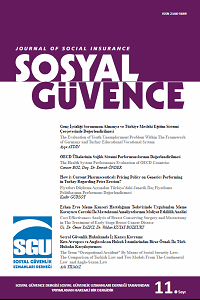Abstract
Sağlık sisteminin etkinliği son yıllarda sıklıkla tartışılan konulardan birisidir.
Sağlık harcamalarının artış eğilimi içinde olması kaynakların etkin kullanılıp
kullanılmadığını sorgulamamızı gerektirmektedir. Bu çalışmanın amacı da OECD
(Ekonomik İşbirliği ve Kalkınma Örgütü) ülkelerinin sağlık sisteminin etkinlik
analizini gerçekleştirmektir. Çalışmada öncellikle kapsamlı bir literatür taraması
ile sağlık sisteminin etkinliğinin değerlendirilmesinde kullanılan değişkenler
belirlenmiştir. Bazı sağlık harcaması değişkenleri girdi olarak bazı sağlık statüsü
göstergeleri de çıktı olarak belirlendikten sonra Veri Zarflama Analizi (VZA) ile
34 OECD ülkesinin hem 2000 hem de 2013 yılı verilerine göre etkinlik analizi
gerçekleştirilmiştir. Ayrıca analizin son aşamasında 34 OECD ülkesi Mahalanobis
Uzaklıklarına göre yapılan eleme sonucunda 27 ülkeye indirilerek bu ülkelerin
etkinliği yeniden analiz edilmiştir. 34 OECD üyesi ülkeden 2000 yılında 15 ülkenin
etkin olduğu, 2013 yılında ise bu sayının 13’e düştüğü tespit edilmiştir. Sağlık
sisteminde etkinliğe ulaşabilmek için ülkeler kendi modellerini geliştirmenin yanı
sıra birbirlerinin deneyimlerinden de yararlanmalıdırlar.
Keywords
References
- Afonso, A. Aubyn, M. S. (2006). Relative Efficiency of Health Provision: a DEA
Abstract
The efficiency of the health system is one of the issues discussed frequently in recent
years. It requires us to question whether resources are utilized effectively or not
since health expenditures are in the increasing trend. The purpose of this study is to
perform the analysis of the efficiency of health systems in the OECD (Organization
for Economic Cooperation and Development) countries. Firstly, the variables used to
assess the efficiency of the health system have been identified with a comprehensive
literature search. After some health expenditure variables determined as input, some
health status indicators determined as output, the efficiency analysis of 34 OECD
countries for both 2000 and 2013 years have been carried out with Data Envelopment
analysis (DEA). In addition, the countries have been evaluated as a result of the
Mahalanobis distance and decreased to 27 countries, on the final stage of analysis the
countries have been re-analyzed. While the number of the effective countries is 15
in 2000 from 34 OECD member countries, the number of the effective countries has
been decreased to 13 in 2013. Countries should benefit from each other’s experiences
as well as developing their own models to achieve effectiveness in the health care
system.
Keywords
References
- Afonso, A. Aubyn, M. S. (2006). Relative Efficiency of Health Provision: a DEA
Details
| Journal Section | Makaleler |
|---|---|
| Authors | |
| Publication Date | February 28, 2017 |
| Published in Issue | Year 2017 Issue: 11 |


